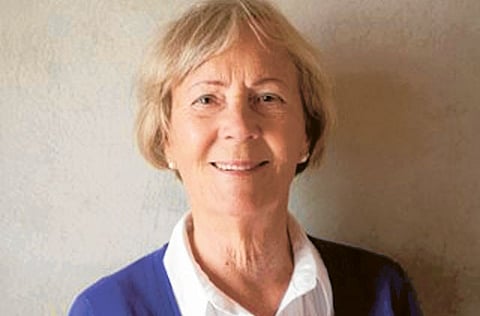Truth without sugar-coating
Lise Kristensen was 10 when she was taken PoW in Java in the 1940s. The Blue Door is the little Lise's voice — unencumbered

The Blue Door makes you think, for long moments, whether it should be read back to front. And it is due to Lise Kristensen's narrative build-up. The last 22 pages bring a sudden trembling force to her voice that holds many undercurrents in its flow. Fear, anguish, hurt, outrage and befuddlement, like soggy coagulations of vegetation sucked from the banks of memory, swirl darkly in her flowing narrative. But the flow occasionally reveals brief swirls of joy too, like a green leaf or two caught in the rushing waters.
Kristensen's memories of the three years spent as a PoW in Java are a triumph of a child's observational powers. Kristensen was only 10 when her family was rounded off by the Japanese army from her home in Java and herded into PoW camps, each one more grinding in its ability to sharpen the desperate survival tactics of its prisoners than the previous one. Little Lise, her mother, sister and baby brother are separated from her father, who is marched off to a different camp. The two parts of the family have no contact with each other right up to the time they are all finally freed.
It is 1942. The Gronn-Nielsens are a healthy, thriving Norwegian family of five living in Java. Daniel Gronn-Nielsen is an insurance and security representative for a Dutch-American company. His wife Kirsten, daughters Lise and Karin, and new-born son Lasse, embody the typical idyllic good life of well-paid expatriates — high living and a life of plenty. A life humming along with abundant house-help, pleasurable pursuits such as horseback riding in the beautiful countryside, copious quantities of food at every meal adorning the dinner table and happy markers of Dutch-Norwegian weekend get-togethers for a cheerful social life. Amid this plenty and prosperity, Lise's nights are the stuff of every young girl's dreams — soft, white sheets, comfortable bedrooms and the security of peace with mama tucking her into bed every night with a kiss. Until the war arrives at her doorstep in the form of Japanese soldiers with a penchant for tenko at every turn (tenko was the order barked by the Japanese camp commanders so the PoWs could bend low as a form of obeisance.)
Descent into chaos
The good life of a 10-year-old turns into a befuddled nightmare overnight and Kristensen captures this cruel flip of life in a painstakingly linear way in The Blue Door. Though she chooses a tricky narrative device — going down memory lane to reclaim her past as the present — Kristensen pulls it off remarkably well. The eyes and mind of 10-year-old Lise are compelling enough to rivet your attention in the then-as-now, and temporarily suspend the knowledge that what you are actually reading is an account of an adult revisiting her tormented childhood.
Kristensen has an astonishing memory, or at least she convinces you that she does, thanks to her immaculate detailing of her nearly three years as a PoW and the excruciating minutes and hours that made up those years.
Drama in the details
Every page is a daily journal of her family's experiences as they are moved from one camp to another. The details are at times overwhelming in their meticulousness but there is a method in her finickiness — it leads to a gradual build-up that suddenly slams home the point that terror and trauma can be born as much from the merciless drudgery of daily disempowerment as from machinations of complex circumstances. For instance, her account of the Fly Hunt, where every prisoner gets a spoon of sugar for 100 flies killed (the Japanese commanders put to good use the PoWs to rid the camps of flies) is simple, stark: "Sugar! I had forgotten what sugar tasted like … It had been so long. I recall Mama sprinkling sugar on strawberries and mangoes … It was like Christmas all over again. Sugar! We had sugar!" Rightly, the adult Lise leaves out the buttressing — which grown-ups are usually guilty of while dredging up their memories — to allow the 10-year-old Lise to come through forcefully.
The Blue Door is packed with such instances of a child's view of internment. Even the discovery of a blue door (which forms the title of the book), a discarded item she discovers in the third camp ends up as a simple symbol of comfort rather than a laboured literary device — the blue door is the only way of avoiding sleeping on the filthy, bug-infested campgrounds.
But it is the afterword of this book that blisteringly reveals the true and lasting damage done to her and her family as prisoners of war. In a summation that is as troubling as it is honest, her life after being freed, Kristensen says, turned out to be like the bitter taste of a fruit that she achingly hoped was ripening to a magical sweetness. Freedom after war is not what it is usually made out to be. It is a freedom, Kristensen says, that comes at a price — and you spend the rest of your life trying to pay for it.
The Blue DoorBy Lise Kristensen, Macmillan, 272 pages, £14.99
Sign up for the Daily Briefing
Get the latest news and updates straight to your inbox


